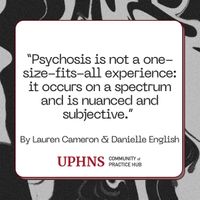Psychosis encompasses symptoms that affect the mind, causing a partial detachment from reality. During a psychotic episode, individuals may experience disruptions in their thoughts and perceptions, blurring the line between what is real and what is not. Subjectivity reigns supreme in this realm, where psychosis feels akin to navigating a surreal landscape that is vividly real yet hauntingly distorted. Picture a reality where your senses deceive you: witnessing sights invisible to others, hearing relentless echoes of voices, or battling an intense paranoia that consumes every thought.
The prevailing stereotype of someone in a state of psychosis conjures images of unkempt individuals speaking to unseen entities on sidewalks and perpetuates a dangerous misunderstanding of this experience. This lack of knowledge is driven by stigma and fear, resulting in isolation and barriers when trying to access the limited resources available for those experiencing psychosis.
In this article, we will offer our own experiences with psychosis to help shape a different narrative: one that is empathetic, kind, and understanding. We will use our lived experience with psychosis to help articulate what it feels like to experience this condition and what we have found supportive while experiencing psychosis. This is not just a personal journey. It's a call for change and a demand for effective and compassionate resources that recognize the human experience in all its complexities and provide equitable support for those in need.
It's crucial to take people's psychosis struggles seriously, treating it with the same gravity as other health issues. Unfortunately, stigma and a lack of political will hinder these efforts, leading to the lumping of psychosis under the broader umbrella of mental health issues. Effective advocacy and care demands open discussions, challenging stigma, and urging a nuanced approach that recognizes the unique nature of psychosis. It’s necessary to align with harm reduction principles, emphasizing personalized support, minimizing judgment, and fostering a compassionate environment for those facing psychosis.
One of the most damaging barriers people in psychosis experience is a lack of access to resources that are supportive and easy to navigate while experiencing paranoia, with little ability to emotionally regulate. A common experience for those with mental health conditions is a lack of understanding and ignorance on the part of service providers. Most service providers have never experienced psychosis, and therefore they don't recognize that many folks are seeking safety and solace in services and practitioners that are ill-equipped to provide it. Often, participants are refused entry from services like shelters and medical care when showing expressions of paranoia or hallucinations, indicating an incongruence in provider and participant needs.
The general public often misunderstands psychosis which leads them to feel afraid of individuals experiencing psychosis and treat them with contempt, disgust, and disapproval. These fears can result in folks experiencing psychosis being blocked or removed from public spaces that offer programs and resources, further isolating and alienating them from the community they are trying to live within. If the goal of our society is total wellness for everyone, then the most socially marginalized must be included in this dream; we all deserve empathy, kindness, and understanding in all cognitive states.
Psychosis is not a one-size-fits-all experience: it occurs on a spectrum and is nuanced and subjective. It is important to emphasize that psychosis is not intrinsically linked with substance use. It can be a symptom of many mental illnesses like Schizophrenia, Schizophreniform disorder, Bipolar disorder, Schizoaffective disorder, and Depression with psychotic features. Individuals may also be in this state as a result of other contributing factors such as trauma, mental illness, sleep deprivation, chronic stress, religious delusions, change of routine, perceived or real abandonment, lack of safe housing, unreasonable work hours, grief, and poverty.
Labeling it as ‘drug-induced psychosis’ simplifies a complex situation and results in folks being offered drug treatment resources in lieu of appropriate mental health support. ‘Recovery’ or ‘sobriety’ does not negate other factors that result in psychosis; this is a dangerous approach and sets folks up for failure. Both of us have experienced psychosis, some related to substance use, some not. Centering drug use in discussions of psychosis removes emphasis from the complexities of human existence and places them onto an inanimate chemical. It removes humanity from the experience and allows for an inappropriate cause-and-effect ideology such as “do you use drugs? You get psychosis. These notions further blame the individual under the guise of “bad choices” as if drug use negated a very real mental health condition.
Let’s explore psychosis symptoms and what it actually feels like for us and our behavioural patterns. In our own experiences, psychosis has felt like being in the middle of a maze with a map written in a language not spoken by you but inherently known by you: like coming home to your childhood house, but all the doors are backward, and the walls are a different colour. There is a familiarity in the beginning that can almost cradle you and invite you in. A detachment from ‘reality’ can feel safe and protective when you are experiencing great trauma or change. We have often had thoughts at the beginning of psychotic episodes along the lines of “This is who I really am and how I truly am meant to exist”, or “I’m only safe with myself, so I should dive further into this place of self and truth". There are moments of calmness and clarity in the stillness of the beginning, but deep fear and confusion quickly follow when perceived reality and delusion clash and combine. In those moments, the line between what is genuine and what is imagined becomes blurred.
When reality and delusion intertwine, individuals show up as uncertain, afraid, and maybe even aggressive. Deep feelings of not being real or superhuman and free from consequence can result in the individual engaging in risky behaviour patterns. For example, in our psychotic episodes, we’ve engaged in cutting, unsafe sex, increased chaotic drug and alcohol use, and emotional abuse. We have felt stuck in thought loops and seem unable to connect larger dots or let go of a certain topic. We may seem stuck or unable to follow logical steps to improve our situation. Communicating with people feels impossible and frustrating because your internal thoughts are tangled and messy. In our experience, the reactivity of others makes it feel safer to be alone and has prevented us from telling people when we are in a psychotic episode. Simple tasks become monumental challenges as thoughts scatter, making it hard to string together coherent ideas, hold a conversation, and connect with others. In those moments, the pain within becomes so overwhelming that self-harm offers respite, and a physical manifestation of what is happening internally can feel validating. It is paramount to understand that this internal turmoil isn’t a choice, and willpower and reason cannot ‘fix’ it.
Our psychotic episodes are not an intentional plunge into madness but rather a facet of our complex mental health that is hidden, shunned, and fueled by internalized shame from a world and healthcare system that stigmatizes vulnerability. One of the worst elements of psychotic episodes for us has been the fallout and lack of understanding from our support circle. You are left to clean the mess up yourself, without help and usually with anger from the ones you love the most. Full of humiliation for what you have said and done you often receive further punishment from those around you. We have lost relationships, jobs, friendships, and our reputations to people who do not understand this condition, and this is one of the factors that can make individuals feel hopeless and suicidal. Much like we do not respond with anger when someone experiences a physical health crisis, we need to stop taking a tough-love approach to mental health crises.
One common belief we’ve experienced from family and friends is that individuals experiencing psychosis should either be left alone without engagement or be compelled to abandon their delusions and conform to rational thinking. Unfortunately, both of these perspectives are inaccurate and unhelpful, often causing more harm and exacerbating the individual's delusions. Isolation feels like a rejection of our identity, and questioning our delusions only leads to increased panic and confusion.
We desperately long for clarity, stability, and relief from the relentless chaos within. To simply sit with someone at a distance that feels safe for them and listening to what they have to say without questioning them can offer so much and help mitigate shame later. With proper support and understanding, there is hope for individuals to reclaim a sense of normalcy, find solace in coming back to reality, and begin to feel safe and anchored in themselves. Helping someone clean their space if they have one, assisting them with their personal hygiene, bringing pre-made meals, and offering a peer navigator with lived experience can really help support people experiencing psychosis. Psychosis is a journey that doesn’t end with the completion of the episode. It is a journey that requires empathy, love, and the unwavering support of those around you.
Communicating with someone experiencing psychosis can seem incredibly difficult and frustrating. Many health care providers engage in combative discourse with these individuals that end in violence or punishment for the person in psychosis. We believe this is due to the lack of basic understanding of what those individuals are experiencing. While we do not believe in validating the delusions people are experiencing, we do advocate for validating the feelings being experienced. The best way to aid in the regulation of others is to show up emotionally regulated yourself.
We also have seen that people who haven’t experienced psychosis often show up reactive, this is where peers supporting peers can be much more supportive and beneficial. There is no need to question the experiences a person is having or to try to ‘snap them out of it’; this is not helpful. We need to stop asking for coherency, regulation, and blind adherence to neurotypical rules of people caught in between the space of reality and delusion who do not have access to that part of their brain at that moment. Instead, we need to offer them a safe, open space to exist as they are free from judgment and with the option to eat and rest if they want to. Reactions that are loud and hyperbolic are not effective when people are in this state. Extreme consequences and removal from resources are not ethical either. We need spaces where people can show up like this without combative nature from others, and lastly, conversations around treatment and sobriety should never be had at this time.
Academically, we need to redefine our approach to psychosis: it is a symptom, not an illness, and a multitude of factors influence it. Just like substance use is used as a scapegoat for the larger issues of poverty and failed policy, psychosis is used as the scapegoat to deem individuals unworthy of help and access to resources. Many folks get permanently banned from resources as a result of behaviours they exhibit in psychotic episodes. In our own lives, with social and economic advantages that we inherit with our colonial white privilege, we have been left to be our own doctors, our own service providers, and our own advocates. This is due partly to the stigma faced in admitting our psychosis and being labeled hysterical or unsafe. We have learned to keep these episodes secret and this compounds the trauma we have faced and the harm experienced during psychotic episodes.
We must address systemic inequity that has deprioritized meaningful investment in mental health resources. We must create spaces that are only for people in psychosis, are safe for them, and do not further stigmatize them. Also, we must stop using forced treatment as the go-to solution and paint psychosis as being only a result of substance use. We must include people with lived and living experiences in these resources and pay them living wages so that individuals can have an advocate during this time who truly understands. We need to include psychosis in the larger conversation around mental health and stop acting like these individuals should be feared and kept out of resources. There is a hierarchy present in the mental health community where some mental health disorders (ie: anxiety and depression) are viewed with sympathy, and others (ie, personality disorders and psychotic episodes) are viewed as the fault of the individual. How can we ask people to show up emotionally intelligent and regulated when they are experiencing delusions that can be outright terrifying?
Emotional intelligence isn’t often possible in psychosis due to overwhelming delusions, and the response to this requires understanding rather than judgment. Moreover, marginalized, unhoused populations face an even greater susceptibility to this kind of demeaning treatment due to a poor allocation of resources to address these issues and inequitable access to care. People in psychosis have a greater risk of experiencing abuse and not being believed because service providers inherently discredit their narrative. Not to mention, most of the resources we have for mental health require access to a cell phone and lengthy wait lists.
In our experience, every time we have tried to advocate for support in a psychotic episode, we have been met with barriers, extreme wait times, and flat-out disgust. On the rare occasion where we have received support, we have experienced a lack of trauma-informed care because we have stripped away the rights of people with mental health illnesses. You can do anything you want to someone deemed crazy because no one believes them or respects them: this opens people in psychosis up to the very real potential for abuse and mistreatment by individuals and the system. The most marginalized must navigate their mental health on top of a relentless struggle for survival and their basic needs, which only amplifies psychotic episodes.
In closing, we remember the times we feared ourselves and our thoughts so deeply, only to realize our care providers felt the same, if not worse, about us. We hope for a future where the conversation around psychosis is humanized with love and support offered instead of avoidance and fear. We ask for understanding and forgiveness for decisions that were made at a time when we were unreachable to ourselves. We advocate and continuously strive for policy change and the de-stigmatization of psychosis and substance use. We believe an approach based on harm reduction, evidence, and empathy can help reduce the long-term consequences of psychotic episodes. Most importantly, we send a message of love to those versions of ourselves and choose to share our story in order to validate others in a similar place of darkness and isolation we, too, have lived. We must dismantle discrimination of people experiencing psychosis and create a political landscape that holds space for those navigating this labyrinth. We call out to our community to include us in the fight for safe health care. Our actions today can shape a more compassionate, inclusive tomorrow.
*Below, you will find a broken down, more specific list of tools for helping people experiencing psychosis*
Avoid Coercion: Never resort to threats or force when encouraging someone to seek medical care during a psychotic episode. Coercion can exacerbate fear and worsen the situation. Instead, approach them calmly and empathetically, offering support and guidance without pressure.
Respectful Dialogue: Refrain from discussing their drug use during episodes of psychosis. It's not the appropriate time for such discussions, as it can agitate or distress the individual further. Focus on providing comfort, ensuring their safety, and helping them fulfill their basic needs. This could look like setting food or water near them without forcing them to take it.
Non-Reactive Approach: Understand that the words or actions of a person in psychosis might not reflect their true feelings or beliefs. Be mindful not to take personally what is said or done during these moments, as it's often a result of their altered reality.
Validating emotions versus delusions: When you do engage, which is not always necessary, sometimes people just want someone to quietly be there, and engage in a way that validates feelings. This could look like, “Yeah, that’s frustrating," “I hear that anger," etc.
Caring and Nonjudgmental Attitude: Offer support with a caring and non-judgmental approach. Avoid patronizing language or condescending behaviour, as it may further alienate the individual. Show empathy and understanding while acknowledging their struggle. Interacting with someone in psychosis demands patience and a non-reactive attitude. By providing a safe and supportive environment without judgment or coercion, you can offer invaluable assistance to those navigating the challenging terrain of psychosis.





